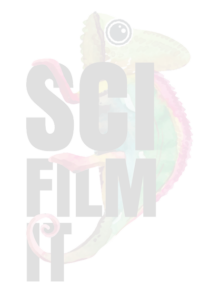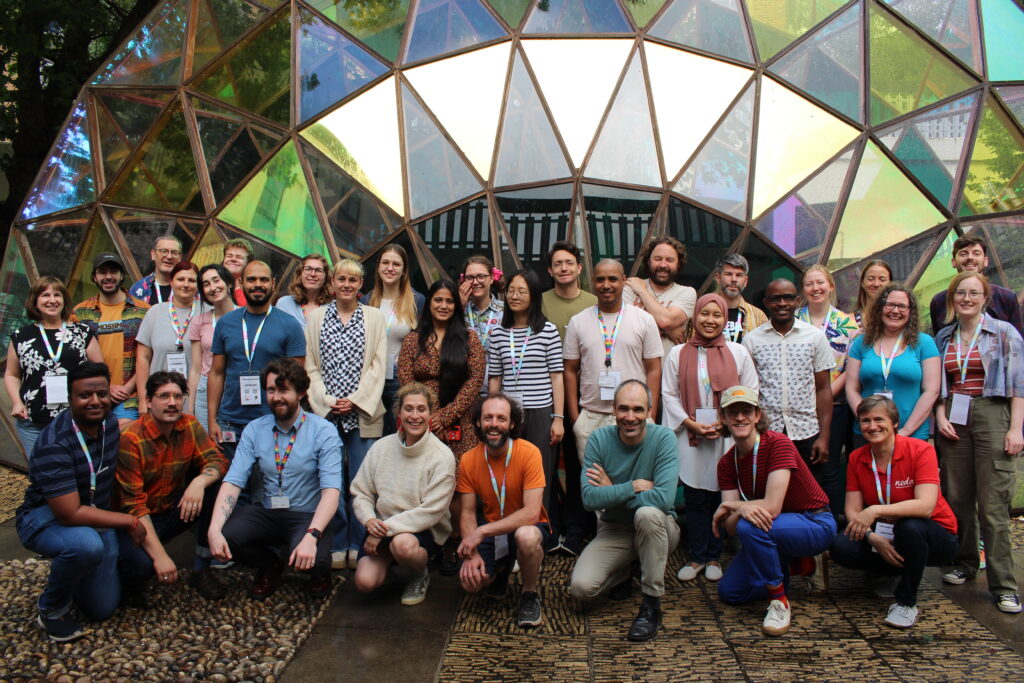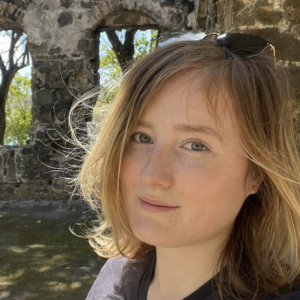
SCIFILMIT HACKATHON BRISTOL 2023
Thank you to everyone who made the SciFilmIt Hackathon Bristol 2023 a success! A massive thank you to Research England and the University of Bristol for providing funding and space/support.
Over the 7-9th of July, 23 Participants joined forces at the School of Chemistry, University of Bristol to learn from each other and work together in small teams to create 6 beautiful films explaining a scientific concept to non-scientific audiences. These films were shown for free at the Watershed cinema on the 11th of July to approx. 100 people accompanied by an engaging Q/A with each team.

A big shoutout to the team of Mentors, who helped guide the participants through the intense process: Dr Robert I’Anson Price, Charlotte Westenra, Dr Samuel Lagier, Assoc Prof Kerstin Preuschoff, Jonny Berliner, and Dr Petia Petrova.
Thank you also to the Shattercones, who provided original music for all the films.
Congratulations to the winners of the JURY PRIZE and the PUBLIC PRIZE! Watch them below!
Jury Prize: Invisible, by Iris (Priyam Suri, Daniel Brown, Amaia Alcalde, Filip Balogh)
Public Prize: Prospecting for Love, by The Paper Scientists (Hero Bain, Jorge Barreto, Xinyuan Meng, Evelyn Greeves)
Check out all the films in the YouTube playlist below!
What is SciFilmIt?
SciFilmIt is a volunteer-powered international association that celebrates the accessibility of science via the cross pollination between scientists, artists and filmmakers.
The ScifilmIt Hackathon is an intensive three day event where scientists, artists and filmmakers work together in interdisciplinary teams to create a short film that communicates a scientific concept to the general public. The finished films are then shown to the public for free in a cinema event the following week. Throughout the hackathon, the teams are mentored by a team of volunteer experts in storytelling, science communication, teamwork and filmmaking. The hackathon is free to attend for participants, and we will feed and water/caffeinate you throughout the duration.
How does the Hackathon work?
Overview
The Hackathon event will take place from the 7th to 9th of July at the School of Chemistry, University of Bristol. Your films will then be screened at the Watershed cinema on the evening of 11th of July for free to the public of Bristol, after which they will be made available online.
Schedule
Day 1: The Hackathon event starts at 9 am on Friday. Throughout the day, you are assembled into your four person teams, you are given seminars from our team of mentors, and are then left to brainstorm what your film will be about with guidance from your team's mentor. By the end of the day, 7:30 pm, all the teams present the idea for their film to the rest of the participants and mentors, and feedback is given to set everyone up for success.
This Day is about getting to grips the challenge ahead and getting to know your team members and mentor.
Day 2: The Saturday starts at 9 am, beginning with the remaining seminars from the team of mentors. Teams are left to refine their ideas and to prepare their scripts for checking by relevant experts in the related field of science across the organising and mentor teams. Once the scripts have been checked, filming can commence, with additional equipment provided by the organising team (lights, stands, reflectors, green screen, etc.). At the end of Day 2, 7:30 pm, teams present what they have produced thus far to the rest of the participants and mentors, and advice is given on how to tackle any challenges.
This Day is about making headway on your films, with the support of your mentor and teammates.
Day 3: The Sunday starts at 9 am, whereby teams recommence with making their films, supported by their mentors. The final version of their films are submitted by 5:30 pm, and an internal screening event takes place after dinner at 7:45 pm. Everyone’s efforts are celebrated, and everyone reconvenes at the public cinema event the following week to show off their films and to spread scientific knowledge to all.
This Day is about pulling it all together and celebrating your team's achievement.
Team Composition
Each team is composed of two Scientists, one Wild Card (referred to as a Black Box in previous years) and one Filmmaker/Animator. Your teams are assembled by the organising team based on your applications to balance diversity of perspective and skills. The purpose of this is to encourage an environment for successful collaboration and skill sharing, and to make sure each team has the right balance of skills to succeed. Teamwork is at the heart of this event, and SciFilmIt seeks to encourage cross-disciplinary collaboration.
Why should I get Involved?
Scientists
You will deepen your understanding of how to communicate scientific ideas through artistic media in an interdisciplinary team.
Wild Card/Black Box
You will experiment with how to apply your unique skill set to a challenging communication project, whilst gaining experience working at the intersection between the sciences and the arts.
Filmmaker/Animator
You will participate in a dynamic and challenging short project working with teammates from a range of backgrounds, and you will get to use your skills to help translate an interesting and complex idea into a finished piece of work to show to, inform and educate the public.
Organizing Team
These are the volunteers behind SciFilmIt Hackathon Bristol 2023. We are a mix of PhDs, post-docs, artists and educators, all sharing our passion for film-making, storytelling and science communication. For this event, we have secured funding from Research England, through the University of Bristol, as part of the Enhancing Research Culture Initiative, which supports events which are focused around public science outreach and researcher training in science communication.

Liam Scarratt
Liam is a Marie Skłodowska-Curie postdoctoral research fellow in the School of Chemistry at the University of Bristol. His area of research is in using atomic force microscopy to study how water containing nanoparticles can help remove oil from surfaces. Liam first was exposed to SciFilmIt during his previous postdoctoral research position at the University of Geneva, Switzerland. He was part of the organizing team for the 2020 Geneva SciFilmIt Hackathon, and was a mentor for the 2021 Lausanne SciFilmIt Hackathon. He is very excited to be bringing the Hackathon event to Bristol, and hopes to put it on back home in Sydney, Australia someday! Outside of his research endeavors, Liam is involved in the arts - performing and composing music, dancing, and doing absurdist sketch comedy with his Australian group, BEAK.

Holly Stockdale
Holly is a PhD student in physical chemistry at the University of Bristol. Her project is focused on investigating friction at the nanoscale and novel boundary lubricants. She has always been curious about the world and the ways in which the arts can be just as informative and eye-opening as the sciences, and the sciences just as inspirational and moving as the arts. When the two come together, amazing things can happen and she is keen to be involved with SciFilmIt for the first time! When she isn’t using beams of neutrons and X-rays to look at molecules, she can be found painting, singing, writing stories and trying to teach herself the violin.

Carlos Rivera Rivera
Carlos is a Marie Skłodowska-Curie postdoctoral research fellow in the School of Biology in the University of Bristol. He is a bioinformatician who builds robots (=programs) that read genomes at lightning speed and ask profound questions about its evolution. Born and raised in the Caribbean, Carlos has been amazed at Nature and Life for as long as he can remember. He is the type of person that stops in a walk every metre to look under rocks. Ocean, rivers, lakes are all strong sources of attraction and fascination for Carlos. Currently his robots are asking the genomes of animals when was it that nervous systems first emerged. Carlos is convinced that knowledge has to be shared in intelligible ways and in good faith, taking seriously and respectfully both the subject’s and the listener's contexts and interests, and to promote this has participated in several science communication projects.

Gemma Kerr
Gemma is a science communicator with a background in maths and physics. She is currently working as a content creator for We The Curious - helping to develop planetarium shows, sourcing films for the Big Screen, presenting workshops, and whatever else she can get her hands on. Gemma is also the creator of The Celestial Tales podcast - exploring astronomy through mythological stories. She first heard about SciFilmIt when chatting with Liam after an improv workshop, and discovering a shared love of blending arts and sciences. Gemma is always looking for any excuse to talk to people about the astronomy ideas in Lord of the Rings - so only bring it up if you’ve got an hour or two to waste!

Anna Nenarokova
Meet Anna, the self-proclaimed crazy Russian scientist (but a peaceful one!), and our Marketing Manager Meerkat! As a postdoc in life sciences, she's fascinated by the origin and early evolution of life. With a love for unravelling mysteries and answering tough questions, Anna is always eager to dive into complex scientific topics. When she's not on her computer deciphering genomes, you might catch her performing improv or exploring other offbeat hobbies. With a talent for making science accessible and fun, Anna is ready to take you on a wild ride through the wonders of the universe! This bio was written with the help of ChatGPT.